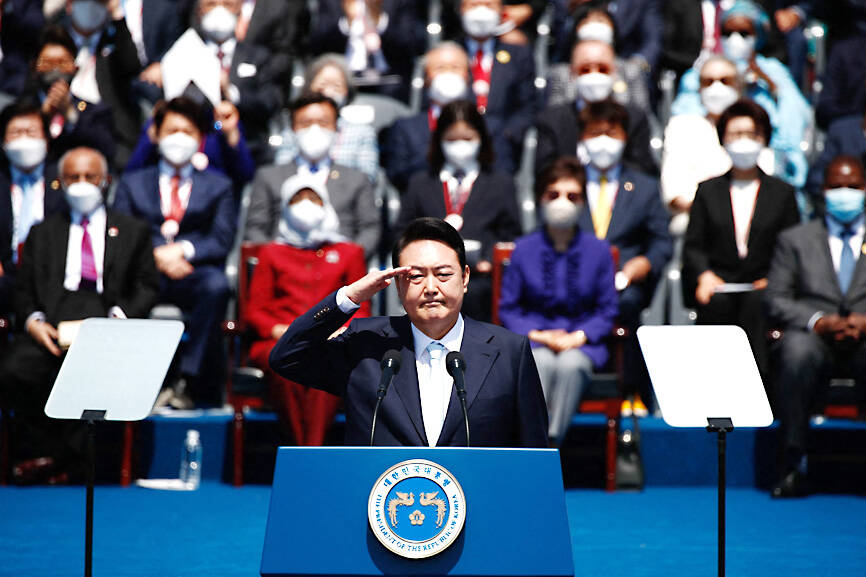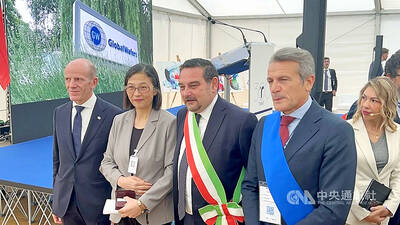South Korean President Yoon Suk-yeol is heading to the Netherlands today for a trip in which he would focus on boosting crucial semiconductor cooperation between the two global chip powerhouses.
High-tech chips are the lifeblood of the modern global economy, used in everything from weapons to cars, and South Korea accounts for about 60 percent of the world’s supply of memory chips, Yoon told AFP in an exclusive written interview.
The Netherlands is home to ASML Holding NV, which produces the lithography equipment that makes semiconductors, and for years the two countries have worked together “in an exemplary manner,” Yoon said, “contributing to the stability of global semiconductor supply chains.”

Photo: AFP
However, the industry is being buffeted by geopolitical turbulence, with semiconductors a flashpoint issue between the US and China, which are locked in a fierce battle over access to chip-making technology and supplies.
The Netherlands recently joined the US and Japan in imposing export restrictions on advanced chip-making equipment aimed at preventing China from acquiring sensitive inputs that could be used in cutting-edge weapons and tech such as artificial intelligence.
“As competition between countries and regions intensifies to gain hegemony over emerging technologies, the semiconductor industry is strategically more important than ever before, which makes this visit to the Netherlands especially meaningful,” Yoon said.
“Semiconductors are the linchpin of [South] Korea-Netherlands cooperation,” he said. “The global semiconductor industry’s stable and sustainable growth is in the core interest of both countries.”
South Korea and the Netherlands share a common understanding that “the economy is now synonymous with security and vice versa,” he added.
ASML supplies South Korea’s major chip makers, Samsung Electronics Co and SK Hynix Inc.
During the state visit, Yoon is to tour the ASML headquarters, including the company’s highly controlled “cleanroom” manufacturing facilities, becoming the first foreign leader to do so.
This “will mark a crucial turning point for the ‘Korea-Netherlands semiconductor alliance,’” Yoon said, adding that discussions on chip cooperation were his “top priority” for the trip, the first by a South Korean head of state since bilateral ties were established in 1961.
Yoon’s office said last week that during the state visit South Korea aims to establish a “chip alliance” with the Netherlands, which would involve governments, businesses and universities from both countries.
The US-led export restrictions have become an issue for Samsung Electronics and SK Hynix, which, like most of the world’s biggest chipmakers, base a large portion of their production, especially of advanced DRAM and flash memory chips, in China.
Experts said that South Korean chip companies needed to find ways to mitigate the impact of controls on shipping advanced microchip production machines to China — curbs which might, for example, prevent them from upgrading their equipment.
However, even as the companies ramp up domestic investment, experts warned that it could take years, maybe decades, to meaningfully shift chip manufacturing away from China.
Seoul is a key regional ally of Washington, and earlier this month, US Secretary of Commerce Gina Raimondo urged US allies to stop China from getting semiconductors and cutting-edge technologies vital to national security.
“The global environment surrounding the semiconductor industry is rapidly changing in tandem with competition for technological supremacy and supply chain restructuring,” Yoon said.
It is clear that “as semiconductors emerge as strategic assets in terms of industry, technology and security, geopolitical risks surrounding global supply chains are expanding,” he said.
South Korea plans “to significantly boost semiconductor cooperation with such major countries as the Netherlands, the United States and Japan going forward,” he added.

RECYCLE: Taiwan would aid manufacturers in refining rare earths from discarded appliances, which would fit the nation’s circular economy goals, minister Kung said Taiwan would work with the US and Japan on a proposed cooperation initiative in response to Beijing’s newly announced rare earth export curbs, Minister of Economic Affairs Kung Ming-hsin (龔明鑫) said yesterday. China last week announced new restrictions requiring companies to obtain export licenses if their products contain more than 0.1 percent of Chinese-origin rare earths by value. US Secretary of the Treasury Scott Bessent on Wednesday responded by saying that Beijing was “unreliable” in its rare earths exports, adding that the US would “neither be commanded, nor controlled” by China, several media outlets reported. Japanese Minister of Finance Katsunobu Kato yesterday also

‘DRAMATIC AND POSITIVE’: AI growth would be better than it previously forecast and would stay robust even if the Chinese market became inaccessible for customers, it said Taiwan Semiconductor Manufacturing Co (TSMC, 台積電) yesterday raised its full-year revenue growth outlook after posting record profit for last quarter, despite growing market concern about an artificial intelligence (AI) bubble. The company said it expects revenue to expand about 35 percent year-on-year, driven mainly by faster-than-expected demand for leading-edge chips for AI applications. The world’s biggest contract chipmaker in July projected that revenue this year would expand about 30 percent in US dollar terms. The company also slightly hiked its capital expenditure for this year to US$40 billion to US$42 billion, compared with US$38 billion to US$42 billion it set previously. “AI demand actually

Jensen Huang (黃仁勳), founder and CEO of US-based artificial intelligence chip designer Nvidia Corp and Taiwan Semiconductor Manufacturing Co (TSMC, 台積電) on Friday celebrated the first Nvidia Blackwell wafer produced on US soil. Huang visited TSMC’s advanced wafer fab in the US state of Arizona and joined the Taiwanese chipmaker’s executives to witness the efforts to “build the infrastructure that powers the world’s AI factories, right here in America,” Nvidia said in a statement. At the event, Huang joined Y.L. Wang (王英郎), vice president of operations at TSMC, in signing their names on the Blackwell wafer to

Taiwan-based GlobalWafers Co., the world’s third largest silicon wafer supplier, on Wednesday opened a 12-inch silicon wafer plant in Novara, northern Italy - the country’s most advanced silicon wafer facility to date. The new plant, coded “Fab300,” was launched by GlobalWafers’ Italian subsidiary MEMC Electronics Materials S.p.A at a ceremony attended by Taiwan’s representative to Italy Vincent Tsai (蔡允中), MEMC President Marco Sciamanna and Novara Mayor Alessandro Canelli. GlobalWafers Chairwoman Doris Hsu (徐秀蘭) said the investment marked a milestone in the company’s expansion in Europe, adding that the Novara plant will be powered entirely by renewable energy - a reflection of its